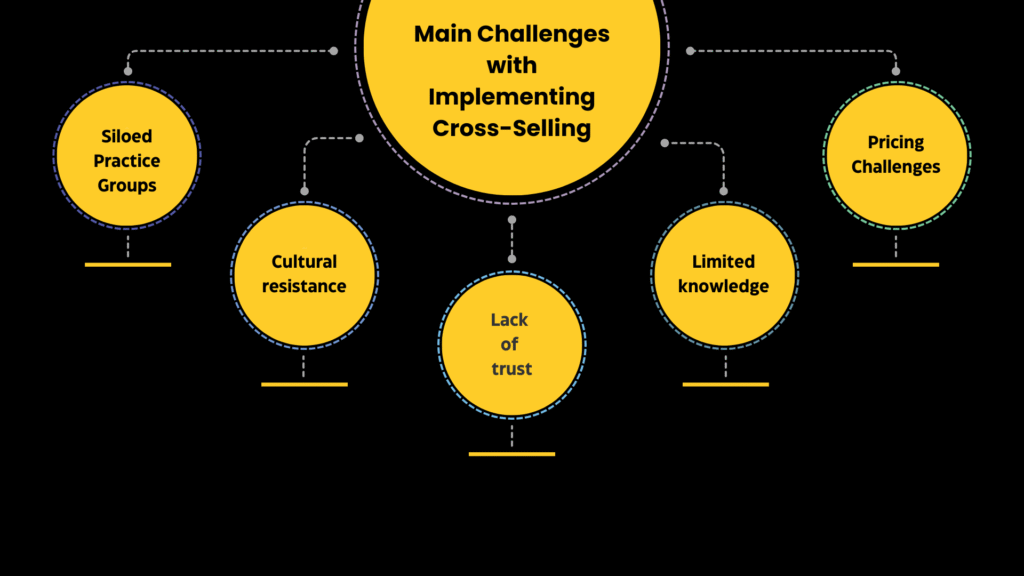The idea of providing additional/complementary legal services is becoming an increasingly popular growth strategy in law firms. Cross-selling is a cost-effective method that boosts client satisfaction and retention since it leverages existing relationships, unlike the traditional client acquisition. This article explores the challenges associated with cross-selling and offers strategies to achieve sustainable growth.
Consider this scenario: Your law firm is hired by an international private equity fund to provide assistance with a high-profile acquisition in India. Your team identifies that the fund will need ongoing regulatory support post deal closure, especially with RBI and SEBI compliance. Prior to closing, you suggest, “We can also support you post-transaction with ongoing regulatory filings and compliance checks—would you like us to outline a monthly retainer structure?”
The key idea: They came to you for M&A support; you timely anticipated the compliance needs that follow and positioned your firm as not just a transaction partner but also a strategic long-term advisor with continuity across upcoming stages.
That’s the beauty of cross-selling – it doesn’t matter if its products or services, it boosts client satisfaction while increasing business and fostering deeper relationships.
What is effective cross-selling?
Imagine this: A lawyer reaches out to a repeat client with a warm message: “Let me take you to lunch for a general catch-up.”
The client agrees, expecting an informal lunch focused on their existing relationship. Once the client confirms, the lawyer follows up with: “Looking forward! I’ll also be accompanied by one of our litigation partners, whom I’d like to introduce to you”.
What was pitched as an informal relaxed lunch now feels like a setup for a sales pitch. Additionally, there is no clear indication that the client requires litigation assistance, making the introduction feel premature and self-serving.
Effective cross-selling hinges on relevance, timing, active listening and trust. A poorly timed, impersonal pitch can damage a relationship instead of nurturing it.
Main Challenges with implementing cross-selling
- Siloed Practice Groups: Lawyers within big firms often operate in silos and are often unaware of the broader, global relationships their firm already enjoys. Result? Millions in potential revenue is left untapped and insightful information that could help the client strategically is also lost.
- Cultural resistance: Cross-selling often feels unnatural for lawyers. Many lawyers consider themselves as legal professionals and not sales person and find pitching additional services inappropriate and uncomfortable.
- Lack of trust in the quality of services offered by other teams: Lawyers fear client being dissatisfied with the new services offered by their colleagues.
- Limited knowledge of firm’s capabilities: Lawyers are simply unaware of their colleagues’ capabilities in other legal services.
- Fear of losing client or control: Lawyers are reluctant to introduce their clients to colleagues with the fear of losing control over the client relationship.
- Compensation model: Rewarding individual revenue generation and not collaboration such as the traditional “eat what you kill” compensation models often discouraging cross-selling.
- Poor internal communication and data sharing: Without centralized data on client interactions and needs (absence of effective client relationship management system) the firm may miss out on identifying cross-selling opportunities.
- Lack of training and support: Most law firms do not provide sufficient training on cross-selling tactics. Lawyers might not feel prepared or inspired to recognize and take advantage of cross-selling opportunities.
- Client resistance to change: Clients may prefer to engage with existing relations in multiple firms instead of relying on a single firm for multiple services to avoid over-dependency on one service provider.
- Pricing Challenges: Cross-selling can lead to various pricing challenges such as in the case where the firm’s fees for certain services are higher than the competitors.

Addressing these challenges requires a strategic approach. Let’s look at some of the best practices for successful cross-selling:
- Reframe “Selling” as “Serving”: the term “cross-selling” sometimes maya carry negative connotations implying a sales tactic. Instead, using “cross-serving” to highlight the act of providing comprehensive solutions to clients’ needs.
- Client-centric Approach: the first step to effective cross-selling is having an in-depth understanding of your clients’ needs which entails doing an assessment to identify service gaps and focusing on solving client’s problems. The focus needs to be problem solving and not increasing billables.
- Foster collaborative firm culture: encouraging a “firm-first” instead of “me-first” mentality. The firm can begin cross-selling efforts on key clients with complex needs, pilot selective initiatives, highlight success stories and gain the buy-in of the lawyers before a firm-wide rollout.
- Compensation models: incentivizing collaboration and recognising both introducers and servicers. For example, setting KPIs like cross-practice revenue per client, implementing a referral program which serves as a catalyst for building a cross-selling culture within the organization.
- Internal education and training: this includes not just training on the “what” and “why” but also the “how” of cross-selling. Additionally, educating lawyers about firm-wide capabilities by holding regular internal sessions conducted by each practice area.
- Leverage Data and Technology: using data analytics helps in identifying cross-selling opportunities. Tools that come very are useful include:
- CRM software to track client touchpoints and potential opportunities.
- Client dashboards that show services used and potential gaps.
- Knowledge management platforms to help lawyers access firm capabilities easily.
Tip: Hiring a dedicated resource who is good with account management, data handling, and CRM tracking can help bridge the gap between you and your clients.
A Journey of Shared Value
Cross-selling is not just pushing additional services onto your clients. It is leading with value and not a pitch. It is about creating an experience where clients discover additional value from your offering that genuinely meet their evolving needs. By understanding clients’ business and proactively identifying areas of value add, you can further strengthen client loyalty which also eventually drives sustainable growth for your firm.